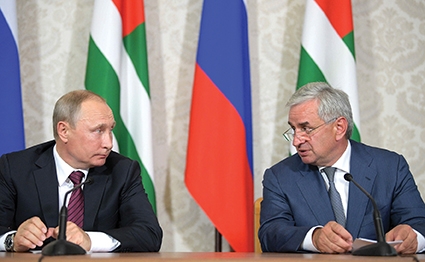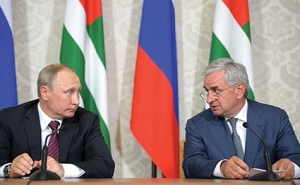Headaches in Abkhazia
OP-Ed
Twenty-four years have passed since the fall of Sokhumi. On September 27, 1993, the city was taken by North Caucasian militants and Abkhazian fighters. Three days later, the separatist military units had reached the River Enguri and the war that began on August 14th ended.
Ceremonies to commemorate the fact, similar in form but different in content, are celebrated annually both in Tbilisi and Sokhumi. Veterans, government officials and families visit the memorials of those who died during the war, recall the 24 subsequent years of drama, light candles and leave... only to meet again the following year, on that same spot and pay tribute to their soldiers.
This year was no exception for Tbilisi, unlike in Sokhumi, where the ceremony held in the Park of Glory started and ended earlier than planned. The workload of de-facto president Raul Khajimba was named as the reason, whose appearance in public has, by the way, been decreasing recently. Locals link his fading out of public life to the increasingly criminal situation, budget plundering and unfulfilled promises given to Moscow. Khajimba is having hard times for sure, since soon they have to host an official delegation from Moscow and Chief Curator of Abkhazia, Vladimir Surkov, for a “solemn” military parade. And the latter will definitely be asking questions for details about Khajimba’s “love story” with Turkey.
Moscow has been irritated by the Turkish-Abkhazian relations, which are becoming ever firmer, and which should also worry Tbilisi. However, for now, Georgian diplomacy chooses pragmatism, as Ankara does not recognize Abkhazian independence and the activities of Abkhazian diaspora living in Turkey should not become a reason for tense relations with one of our main trading and transport partners. Moscow has a completely different position, as the North Caucasian problem is still unresolved, the “Circassian Bomb” is ticking and they are far from wanting the Turkish “soft power” to come along the Black Sea coast which would increase its power through trade and informational, cultural and other mediums.
It is no longer a secret that Turkish companies are exporting coal from Khajimba’s home town Tkvarcheli and that he has personal business interests. Khajimba’s government previously argued that the agreements were made only with 10% of the companies, the ones that Abkhazia had attracted independently of Russia. But Moscow finds this logic absurd: first of all, if not for those 90%, the 10% would not exist and, most importantly, the moment Russia closes its market to Abkhazian products (citrus, tea, mineral water, vegetables, etc.) everything will be over. Nevertheless, the source of Khajimba’s main headache is different. Surkov will be more interested in the law on Free Trade of Real Estate, which has not been adopted despite Khajimba guaranteeing this to the Kremlin. Surkov will demand that the Abkhazian government quickly adopt it, so that Russian citizens can begin purchasing property, that is about 40-50 thousand houses and apartments that earlier belonged to Georgians. Ethnic cleansing organizers had a plan to sell this property to Abkhazian diaspora residing in Turkey, but failed to do so, which is an interesting phenomenon, proving that the diaspora do not wish to settle in Russian-controlled Abkhazia, having as it does zero prospects of independent development.
During the military parade on September 30, Khajimba faced a difficult day, just like his predecessor Aleksandr Ankvab did. On the last parade of his presidency, Ankvab had an armored vest on. Crazy? The so-called president, whose territories are protected by the powerful Russian army, puts on an armored vest prior to making a speech at a parade celebrating independence, so that a sniper doesn’t shoot him right on the tribune... Whether Khajimba put on the same vest on September 30 is not clear, but he has already proved that he is not fond of public celebrations anymore...
Zaza Jgarkava












